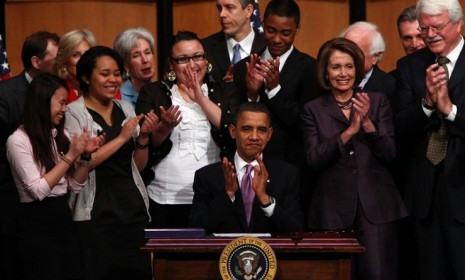Can 'ObamaCare' survive the Supreme Court?
The president's signature domestic achievement is about to face the ultimate test. A concise guide to the ins and outs of the case

A free daily email with the biggest news stories of the day – and the best features from TheWeek.com
You are now subscribed
Your newsletter sign-up was successful
The Supreme Court on Monday will begin an epic, three-day session to hear opposing arguments over President Obama's overhaul of the health-care system. With six hours of debate scheduled, it's the high court's longest round of oral arguments in 45 years. And you have to reach back to the administration of President Franklin D. Roosevelt to find the last time that the court ruled "on a president's signature legislative victory in the midst of a re-election campaign," says Seth Stern at Bloomberg Businessweek. Here, a guide to the blockbuster case:
Why are there so many hours scheduled?
The court is examining four separate angles of the case, each of which is fairly complex. The main attraction comes on Tuesday, when the litigants will address the heart of the matter: Does Congress have the constitutional authority to penalize Americans who do not buy health insurance?
The Week
Escape your echo chamber. Get the facts behind the news, plus analysis from multiple perspectives.

Sign up for The Week's Free Newsletters
From our morning news briefing to a weekly Good News Newsletter, get the best of The Week delivered directly to your inbox.
From our morning news briefing to a weekly Good News Newsletter, get the best of The Week delivered directly to your inbox.
Who launched the suit against the law?
The suit was brought by 26 states, led by Florida. The states argue that the Constitution's Commerce Clause — which gives Congress the right to "regulate commerce with foreign nations, and among several states" — does not allow Congress to penalize people for not purchasing health insurance. In their formulation, lawmakers are levying taxes on citizens for what is essentially "inactivity" — or doing nothing.
What does the Obama administration say?
The Obama administration rejects the "inactivity" claim, arguing that every citizen in the U.S. is already using the health-care system. When uninsured people get sick, hospitals are required by law to treat them, which bumps up insurance costs for everyone else. Congress is within its rights, therefore, to regulate that activity by imposing the individual mandate.
A free daily email with the biggest news stories of the day – and the best features from TheWeek.com
What do we know about the court's views?
Analysts say the legislation is "unprecedented" in nature, so it's hard to determine how the justices will vote. Generally speaking, the court leans conservative, and has moved rightward since Chief Justice John Roberts joined the bench in 2005. In the Roberts era, the court has issued several landmark decisions that put a distinctly conservative stamp on American jurisprudence and government, including its controversial Citizens United decision, which essentially allowed unlimited campaign spending by corporations.
So is "ObamaCare" doomed to be struck down?
No. It's widely agreed that the court's four liberals will likely vote to uphold the law. Justice Clarence Thomas, arguably the court's most conservative member, is expected to support overturning it. That leaves Roberts and justices Antonin Scalia, Anthony Kennedy, and Samuel Alito — all of whom are being targeted by the Obama administration for a crucial fifth vote.
Can they be swayed?
Scalia is famous for excoriating liberal arguments with his acid pen, but he is getting a lot of attention from the Obama team. In the 2005 decision Gonzalez v. Raich, Scalia wrote a broad defense of Congress' interstate commercial powers, and the Obama administration has quoted that opinion 10 times in the briefs it submitted to the Supreme Court. Roberts himself is also considered to be "gettable," says Robert Barnes at The Washington Post, because he's "sensitive to the perception" that the court's "decisions are politicized." Kennedy is also being courted, as he's considered the most liberal of the court's five conservatives.
Are there other factors at play?
Conservative judges have long preached judicial restraint, says Mike Sacks at The Huffington Post, and to strike down a law of the land could be seen as violating that principle. "If the individual mandate is as unpopular among Americans as public opinion polls report, then the court can let the democratic process play out," as conservatives are always telling liberals to do. On the other hand, the conservative justices have been perfectly happy ignoring judicial restraint in recent decisions, says Dahlia Lithwick at Slate. It's "less about whether the justices can find a way to strike down the law if they so choose — they can — than whether they have the political stomach to do it" in an election year.
Sources: Bloomberg Businessweek, The Huffington Post, The New York Times, Reuters, Slate, The Washington Post